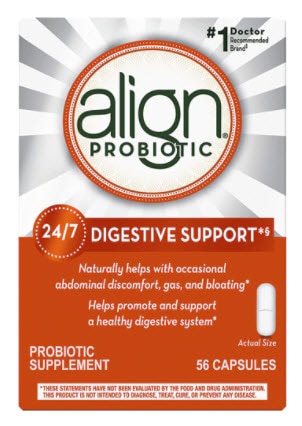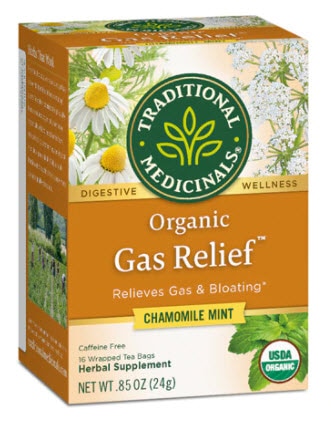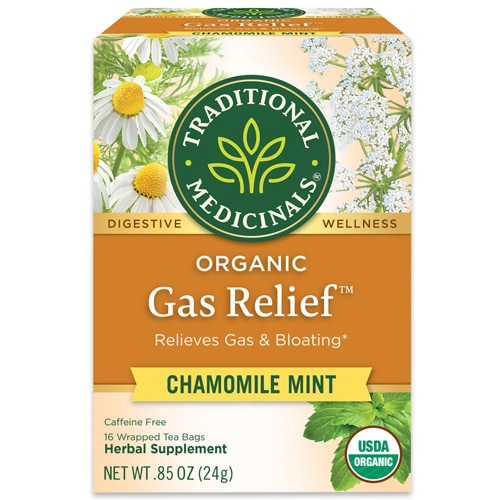If you’ve ever gotten up in the morning with a happy gut and gone to bed feeling like you swallowed a balloon, you’re not alone.
Fifteen to thirty percent of Americans suffer from bloating at some point in their lives. It’s even more common among
people with irritable bowel syndrome (IBS)—particularly
women—and can cause pain and discomfort that interferes with daily activities.
Do probiotics help with bloating? Or can they make symptoms worse?
Knowing why you’re bloated can help you choose the right solution and feel better fast.

What is bloating?
When you’re bloated, your abdominal area typically feels full or tight. The pressure can range from uncomfortable to painful depending on the cause. (Your stomach may or may not stick out;
distention only happens in about half of cases.)
Bloating is most commonly associated with gas, but many other things can cause it, including:
- Poor food choices
- Overeating
- Food allergy or intolerance
- Swallowing air when chewing gum or eating too fast
- Sudden increase in fiber intake
- Hormonal fluctuations
- Medications or supplements
- Imbalanced gut bacteria (dysbiosis)
- Digestive conditions like IBS, inflammatory bowel disease (IBD) and small intestine bacterial overgrowth (SIBO)
- Conditions that affect how quickly food moves through the digestive tract
- Low pancreatic enzymes, which makes it harder for the body to break down food
There’s even a condition called visceral hypersensitivity that can make you feel bloated when you’re not. This is more common in people with IBS who are already sensitive to uncomfortable digestive symptoms.
Do probiotics help with bloating?
In some cases, probiotics may be able to reduce or eliminate bloating. In a small study of people with functional bowel disorders like IBS,
Bifidobacterium lactis Bi-07 and Lactobacillus acidophilus NCFM strains were shown to effectively reduce symptoms.
For people with functional constipation, the probiotic strain
Bifidobacterium lactis HN019 may be able to increase bowel movement frequency. This could potentially relieve the bloating and pain often associated with the condition.
You probably don’t have to seek out these specific strains if a bowel condition isn’t the cause of your bloating. Probiotic supplements that include
Bifidobacterium or Lactobacillus strains seem to be the most helpful for relieving occasional discomfort.
However, probiotics won’t make you feel better right away; you have to take them consistently over time. To get
more immediate relief:
You can prevent bloating
in the long term by:
- Drinking more water
- Exercising regularly
- Keeping portion sizes reasonable
- Chewing food thoroughly
- Kicking your soda habit, if you have one
- Avoiding sugar alcohols like xylitol
- Gradually adding more high-fiber foods to your diet
- Getting tested for food allergies, and eliminating trigger foods
Along with probiotics, these remedies and lifestyle changes should minimize how often you experience bloating.
Can probiotics cause bloating?
You might find that probiotics
don’t make your bloating go away; sometimes supplementing can make symptoms worse. Everyone’s gut is different, which means a probiotic that works great for your friend might give you
side effects—including bloating.
In fact,
bloating and gas are the most common issues people report when taking probiotics. These may resolve once your body gets used to the new strains of bacteria, but if it doesn’t, you should stop supplementing and look for a different formula. Choosing a lower potency can also help prevent bloating from probiotics.
There are, however, two conditions where probiotics should be avoided:
- In SIBO, there’s already too much bacteria in the small intestine. Introducing more bacteria in the form of probiotics can exacerbate the condition.
- People with short bowel syndrome don’t have a fully intact digestive tract, usually as the result of surgery. This puts them at higher risk for developing SIBO, and there’s some concern that probiotics may be a trigger.
That’s why it’s important to talk with your doctor if your bloating is more than an occasional problem. Bloating that recurs regularly or is accompanied by other symptoms like pain, constipation or diarrhea should be evaluated by a doctor.
But, if you’re just looking for relief on those days when your digestive system is feeling a bit off, probiotics may be able to help with bloating and keep your gut happy from morning to night.
Featured Products








